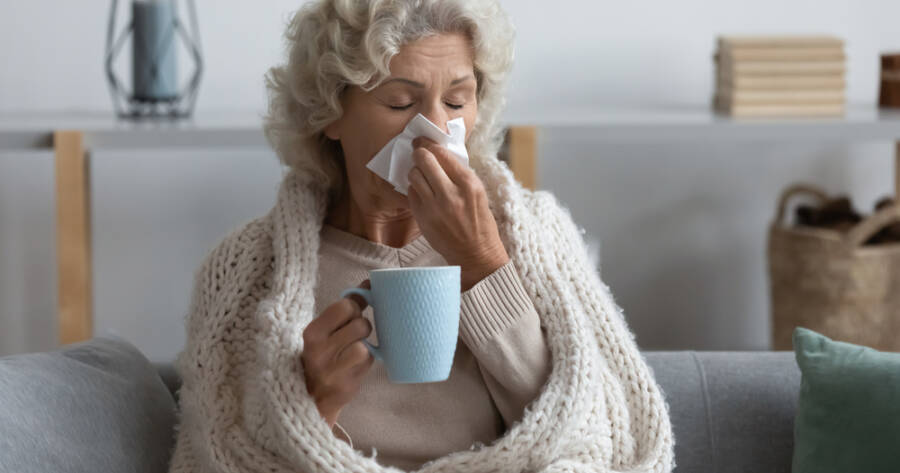RSV isn’t just for kids. Adults can get it, too! That makes it important to know the difference between RSV and a common cold — whether or not you have kids.
Understanding the distinctions between RSV and a common cold can be lifesaving, especially for adults with underlying health issues. Awareness and early detection are the key to preventing and managing RSV effectively.
Do Adults Get RSV?
When you think of RSV (Respiratory Syncytial Virus), you may automatically associate it with children. However, adults can also contract this viral infection.1 RSV in adults is more common than you might think, and it’s essential to understand the symptoms, risks, and treatment options.
RSV is a highly contagious virus that primarily affects the respiratory system. It can cause mild to severe symptoms, depending on the individual’s overall health and immune system. While RSV is more prevalent in infants and young children, adults with weakened immune systems or underlying health conditions are also at risk.
Common symptoms of RSV in adults include:
- Congestion and runny nose
- Coughing and wheezing
- Sore throat
- Fever
- Fatigue
If you experience these symptoms, it’s crucial to consult a healthcare professional for an accurate diagnosis. RSV can be easily mistaken for a common cold or flu, but proper identification is essential for appropriate treatment.
RSV can lead to more severe complications in adults, especially those with compromised immune systems or chronic respiratory conditions. Pneumonia and bronchiolitis are common complications associated with RSV in adults. Therefore, it’s vital to seek medical attention if you suspect you have RSV.
RSV vs. Colds: Similarities and Differences
RSV and the common cold share some similarities in terms of symptoms, but there are also distinct differences that can help you differentiate between the two.2
Similarities:
- Congestion and runny nose
- Coughing
- Sore throat
- Fatigue
Differences:
- RSV symptoms tend to be more severe and can lead to complications, especially in adults with weakened immune systems.
- RSV symptoms typically last longer than a common cold.
- Wheezing is more common with RSV and can be a sign of more severe respiratory distress.
- While both RSV and colds can cause fever, it is more common and often higher with RSV.
It’s important to note that RSV can be transmitted through respiratory droplets, just like the common cold. Therefore, practicing good hygiene, such as washing hands frequently and avoiding close contact with infected individuals, can help reduce the risk of contracting RSV.
Preventing RSV in Adults
Prevention is key when it comes to RSV, especially for adults who may be more susceptible to severe symptoms. Here are some preventive measures you can take:
- Wash your hands regularly with soap and water for at least 20 seconds.
- Use hand sanitizer when soap and water are not available.
- Avoid close contact with individuals who have respiratory infections.
- Clean and disinfect frequently touched surfaces.
- Cover your mouth and nose with a tissue or your elbow when coughing or sneezing.
- Stay home if you’re feeling unwell to prevent spreading the virus to others.
Additionally, individuals at high risk for severe RSV, such as those with compromised immune systems or chronic respiratory conditions, may benefit from preventive measures such as RSV immunization.
Treating RSV in Adults
If you suspect you have RSV, it’s important to seek medical attention. While there is no specific treatment for RSV, healthcare professionals can provide supportive care to manage symptoms and prevent complications. This may include rest, hydration, over-the-counter medications to relieve symptoms, and in severe cases, hospitalization.
It’s important to note that antibiotics are not effective against RSV since it is a viral infection. However, antiviral medications may be prescribed in certain cases, especially for individuals with weakened immune systems.
The Impact of RSV on Public Healthcare Systems
RSV presents significant challenges to public health. As a highly contagious virus, it leads to increased hospitalizations, particularly during the colder months, straining healthcare resources. Its symptoms, often similar to those of other respiratory infections, necessitate accurate diagnosis and efficient management to prevent its spread. Recognizing the broader implications of RSV helps in formulating effective public health strategies, emphasizing the need for increased awareness and prevention measures.
Why You Should Learn More About RSV in Adults
RSV isn’t just a virus that affects children. Adults can also contract RSV, and it’s crucial to understand the symptoms, risks, and treatment options. Differentiating between RSV and a common cold is essential for appropriate care. If you suspect you have RSV, consult a healthcare professional for an accurate diagnosis and proper management. Remember to practice good hygiene and take preventive measures to reduce the risk of contracting RSV. Start searching online today to learn more about RSV in adults and how to protect your health.
